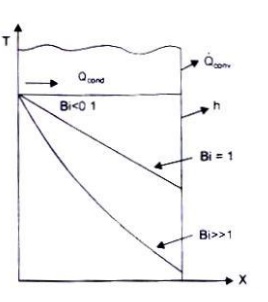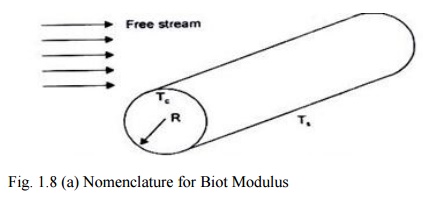Chapter: Mechanical : Heat and Mass Transfer : Conduction
Unsteady Heat Conduction
UNSTEADY HEAT CONDUCTION :
Transient State Systems-Defined
The process of heat
transfer by conduction where the temperature varies with time and with space
coordinates, is called 'unsteady or transient'. All transient state systems may
be broadly classified into two categories:
(a)
Non-periodic Heat Flow System - the
temperature at any point within the system changes as a non-linear function of
time.
(b)
Periodic Heat Flow System - the
temperature within the system undergoes periodic changes which may be regular
or irregular but definitely cyclic.
There are numerous
problems where changes in conditions result in transient temperature
distributions and they are quite significant. Such conditions are encountered
in - manufacture of ceramics, bricks, glass and heat flow to boiler tubes,
metal forming, heat treatment, etc.
Biot and Fourier Modulus-Definition and
Significance
Let
us consider an initially heated long cylinder (L >> R) placed in a moving
stream of fluid at
T¥ <Ts
, as shown In Fig. 3.1(a). The convective heat transfer coefficient at the
surface is h, where,
Q
= hA ( Ts -T¥)
This
energy must be conducted to the surface, and therefore,
Q = -kA(dT / dr) r = R
or, h( Ts - Tm
) = -k(dT/dr)r=R =
-k(Tc-Ts)/R
where Tc is the temperature at the axis of the
cylinder
By rearranging,(Ts - Tc) / ( Ts - Tm ) h/Rk (3.1)
The term, hR/k, IS
called the 'BlOT MODULUS'. It is a dimensionless number and is the ratio of
internal heat flow resistance to external heat flow resistance and plays a
fundamental role in transient conduction problems involving surface convection
effects. I t provides a measure 0 f the temperature drop in the solid relative
to the temperature difference between the surface and the fluid.
For Bi << 1, it
is reasonable to assume a uniform temperature distribution across a solid at
any time during a transient process.
Founer Modulus - It is also a dimensionless number
and is defind as
Fo= at/L2 (3.2)
where
L is the characteristic length of the body, a is the thermal diffusivity, and t
is the time
The Fourier modulus measures the magnitude of the
rate of conduction relative to the change in temperature, i.e., the unsteady
effect. If Fo << 1, the change in temperature will be experienced by a
region very close to the surface.

Fig. 1.7 Effect of Biot Modulus on steady state
temperature distribution in a plane wall with surface convection.

Fig.
1.8 (a) Nomenclature for Biot Modulus
Related Topics